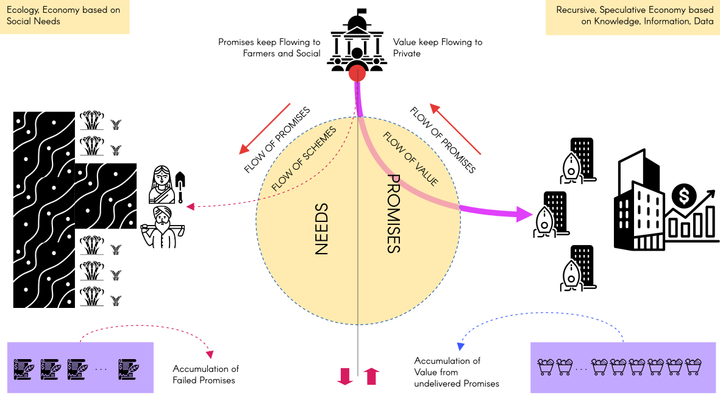On Distance Education
We should consider this global crisis as a chance to reflect, and imagine a better system. The crisis needs to be a time we ask hard questions about the education system and what role examinations, attendance, and virtual tools play to provisioning educational resources. Education is a central institution in our society, and teaching has become a labour essential to imagine our society running at all. This labour is increasingly being done by women. Any plan for the education system to navigate through this crisis and beyond must keep teachers at the centre.
Politically Mathematics is a collective of committed individuals associated with mathematics out of interest, occupation, and study. We aim to engage with mathematics as a practice and profession, in its relationship to the state, industry, finance, education and the nature of work in society, to recover the political character of mathematics.
This statement comes in the aftermath of the nationwide lockdown taken as a step to mitigate the global pandemic of COVID 19 in India. The lockdown included a nation-wide shutdown of schools and other educational institutions, where students were made to either make use of online education or stop going to school altogether.
The sudden lockdown has affected the entire educational establishment in India. The large labour force of teachers, children across classes, including many children who were barely or not at all served by the current educational system, and parents had to adapt to an uncertain situation quickly.
In this time, there came a myth that online education could replace education in a physical classroom as the primary mode. Online education was considered as a saviour of the education system to ensure that the regular academic cycle would not get interrupted.
Due to the elite attitude on education, India never took open universities or distance education seriously as it was mainly the marginalised who used it. Strangely, Online and Distance learning is now being celebrated as a replacement when just a few months ago, degrees based on distance learning had difficulty being recognized.
From our interactions, we found that even those high up in the administration were not equipped with information or resources to adapt educational systems to the lockdown. The lack of transparency regarding the course the lockdown would take left many unknowns uncared for.
We are concerned by efforts made by the state and educational institutions to try to continue running the semester calendar as business as usual, and prioritize the normal maintaining the examinations despite a global pandemic. This shows how unrelatable the education system is to the everyday life of students when it cannot respond to such a monumental event. At the same time, the people and infrastructure have been treated as expendable, as elementary schools have been turned into quarantine centres and teachers into relief workers.
The solutions provided have been narrow and have led to increased divisions in an already unequal society. For many of the country’s poor, the mid-day meal scheme provides essential nutrition for children and has led to hunger. For many of the country’s women, the physical space of school has sometimes been a place of freedom from many of the hierarchies and violence of the domestic space. For many children and women in the country, the home is a place of violence, and school has given them some respite. The lockdown eliminated even that respite.
Most importantly, the suddenness of the lockdown and the lack of planning of information has caused a collective trauma on children. For them, they have only been told that the world is plunging into chaos and for that reason, they can no longer go to school. There has not been any stock taken about how this is affecting the family lives of students and parents, or how this sudden deprivation of public space has affected them.
We are also concerned about the financial toll the lockdown has had on the education system. Are teachers getting paid in this period? When such a large portion of our education has been privatized, are parents made to pay for education that is deprived of basic infrastructure? What schemes are being pushed by the state to mitigate the financial repercussions on the education sector?
The push for online education has introduced new security concerns. The government seems keen on either privatizing content or keeping a central tab on it through the Ministry of Human Development, which introduces concerns regarding surveillance and privacy. Efforts to push online content have acted as public subsidies for private companies who have been able to profit from the adjustments that have to be made at this time. Lack of public digital platforms has further benefitted those private players.
Digital platforms whether under the guidance of a central authority, like the MHRD or private companies will not reduce the digital divide, but will increase the class divide. Overreliance on online educational content will not deliver quality education to deprived students, and will not reduce the social capital that elite institutions monopolize. Overreliance on online content will only deny students the physical space that they need to grow and explore and take education away from them while continuing to operate with business as usual.
Beyond these concerns, the lockdown has exposed many failings of the education system. The recent migrant crisis exposed how many have been left out of the India development promise. The inability of the system to adapt has shown the dangers of a centralized decision-making structure, and the recent efforts by states to amend labour laws show how the state is prioritizing economic productivity over the needs of working-class families.
We should consider this global crisis as a chance to reflect, and imagine a better system. The crisis needs to be a time we ask hard questions about the education system and what role examinations, attendance, and virtual tools play to provisioning educational resources. Education is a central institution in our society, and teaching has become a labour essential to imagine our society running at all. This labour is increasingly being done by women. Any plan for the education system to navigate through this crisis and beyond must keep teachers at the centre.
We demand:
- The state must provide systems of provisioning food even when schools are closed for children enrolled in the Mid-day meal scheme.
- The state should ensure that free textbooks, notebooks or other educational resources, normally supplied to children, do reach them during this time of disruption as well since they can continue to learn even when classes cannot be conducted.
- The state should develop effective decentralised education models working with local governments and attached institutions. Internet-based instruction should use secure decentralized technology platforms.
- There need to be Panchayat level data collection on students and their varied educational requirements
- The state must arrange proper teacher training initiatives on effective use of technologies. Technology-based initiatives need to aid teachers and should be designed with their needs in mind, ideally in consultation with people working in education, not in a top-down fashion.
- There needs to be regional coordination of education resources, including systems for clustering across villages and regions.
- The state needs to take up the serious issue of domestic violence, especially in times of lockdown. There need to be spaces and programs apart from the home that can be places of respite for children and women seeking escape, or even temporary respite, from violent home environments. These spaces and programs should work in concert with healthcare systems.
- Private education systems should be nationalized with schemes in place to ensure education for students and job security for teachers.
- Examinations, which will be a perennial risk for disease outbreak, should be done away with, and there should be a universal no-detention policy put in place. The safety, future and security of students must be safeguarded.

